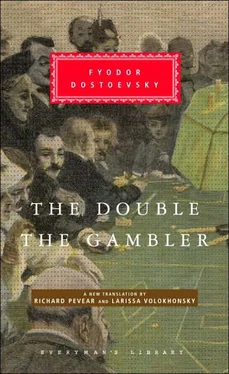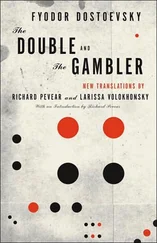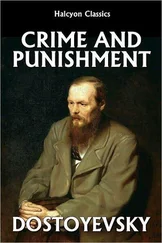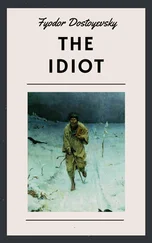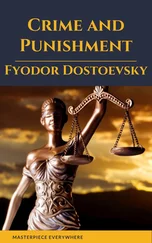Fyodor Dostoevsky - The Double
Здесь есть возможность читать онлайн «Fyodor Dostoevsky - The Double» весь текст электронной книги совершенно бесплатно (целиком полную версию без сокращений). В некоторых случаях можно слушать аудио, скачать через торрент в формате fb2 и присутствует краткое содержание. Жанр: Классическая проза, на английском языке. Описание произведения, (предисловие) а так же отзывы посетителей доступны на портале библиотеки ЛибКат.
- Название:The Double
- Автор:
- Жанр:
- Год:неизвестен
- ISBN:нет данных
- Рейтинг книги:4 / 5. Голосов: 1
-
Избранное:Добавить в избранное
- Отзывы:
-
Ваша оценка:
- 80
- 1
- 2
- 3
- 4
- 5
The Double: краткое содержание, описание и аннотация
Предлагаем к чтению аннотацию, описание, краткое содержание или предисловие (зависит от того, что написал сам автор книги «The Double»). Если вы не нашли необходимую информацию о книге — напишите в комментариях, мы постараемся отыскать её.
Poor Folk.
The Double
The Double — читать онлайн бесплатно полную книгу (весь текст) целиком
Ниже представлен текст книги, разбитый по страницам. Система сохранения места последней прочитанной страницы, позволяет с удобством читать онлайн бесплатно книгу «The Double», без необходимости каждый раз заново искать на чём Вы остановились. Поставьте закладку, и сможете в любой момент перейти на страницу, на которой закончили чтение.
Интервал:
Закладка:
“Sorry, sir, but you can’t, sir. I’ve been ordered not to receive you, sir, I’ve been told to refuse you. That’s what!”
Mr. Goliadkin turned pale. Just then the inside door opened and Gerasimych, Olsufy Ivanovich’s old valet, came out.
“See here, Emelyan Gerasimovich, he wants to come in, and I…”
“And you’re a fool, Alexeich. Go in and send the scoundrel Semyonych here. You can’t, sir,” he said politely yet resolutely, turning to Mr. Goliadkin. “Quite impossible, sir. They ask to be excused, but they cannot receive you, sir.”
“That’s what they told you, that they cannot receive me?” Mr. Goliadkin asked hesitantly. “Pardon me, Gerasimych. Why is it quite impossible?”
“Quite impossible, sir. I’ve announced you, sir; they said they ask to be excused. Meaning they cannot receive you, sir.”
“But why? how come? how…”
“Sorry, sorry!…”
“Though how can it be so? It’s not possible! Announce me…How can it be so? I’ve come to dinner…”
“Sorry, sorry!…”
“Ah, well, anyhow, that’s a different matter—they ask to be excused. Pardon me, though, Gerasimych, but how can it be so, Gerasimych?”
“Sorry, sorry!” Gerasimych protested, moving Mr. Goliadkin aside quite resolutely with his arm and giving wide way to two gentlemen who at that moment were entering the front hall.
The entering gentlemen were Andrei Filippovich and his nephew, Vladimir Semyonovich. They both looked at Mr. Goliadkin in perplexity. Andrei Filippovich was about to say something, but Mr. Goliadkin had already made up his mind; he was already leaving Olsufy Ivanovich’s front hall, lowering his eyes, blushing, smiling, with a totally lost physiognomy.
“I’ll come later, Gerasimych; I’ll explain; I hope all this will not be slow to clarify itself in due time,” he said in the doorway and partly on the stairs.
“Yakov Petrovich, Yakov Petrovich!…” came the voice of Andrei Filippovich, who followed after Mr. Goliadkin.
Mr. Goliadkin was already on the first-floor landing. He turned quickly to Andrei Filippovich.
“What can I do for you, Andrei Filippovich?” he said in a rather resolute tone.
“What is the matter with you, Yakov Petrovich? How on earth…?”
“Never mind, Andrei Filippovich. I’m here on my own. It is my private life, Andrei Filippovich.”
“What is this, sir?”
“I say, Andrei Filippovich, that it is my private life and, as far as I can see, it is impossible to find anything reprehensible here with regard to my official relations.”
“What! With regard to your official…What, my dear sir, is the matter with you?”
“Nothing, Andrei Filippovich, absolutely nothing; a pert young lady, nothing more…”
“What?…What?!” Andrei Filippovich was at a loss from amazement. Mr. Goliadkin, who thus far, talking with Andrei Filippovich from downstairs, had been looking at him as if he was about to jump right into his eyes—seeing that the head of the department was slightly bewildered, almost unwittingly took a step forward. Andrei Filippovich drew back. Mr. Goliadkin climbed one step, then another. Andrei Filippovich looked around uneasily. Mr. Goliadkin suddenly went quickly up the stairs. Still more quickly Andrei Filippovich jumped back into the room and slammed the door behind him. Mr. Goliadkin was left alone. It went dark in his eyes. He was totally thrown off and now stood in some sort of muddled reflection, as though recalling some circumstance, also extremely muddled, that had happened quite recently. “Ah, ah!” he whispered, grinning from the strain. Meanwhile from the stairs below came the sound of voices and footsteps, probably of new guests invited by Olsufy Ivanovich. Mr. Goliadkin partly recovered himself, hastily turned up his raccoon collar, covered himself with it as much as he could, and, hobbling, mincing, hurrying, and stumbling, began to go down the stairs. He felt some sort of faintness and numbness inside him. His confusion was so strong that, on going out to the porch, he did not wait for the carriage but went straight to it himself across the muddy courtyard. Reaching his carriage and preparing to put himself into it, Mr. Goliadkin mentally displayed a wish to fall through the earth or even hide in a mouse hole together with his carriage. It seemed to him that whatever there was in Olsufy Ivanovich’s house was now looking directly at him from all the windows. He knew he would surely die right there on the spot if he turned around.
“What are you laughing at, blockhead?” he said in a rapid patter to Petrushka, who readied himself to help him into the carriage.
“What have I got to laugh at? It’s nothing to me. Where to now?”
“Home now, get going…”
“Home!” shouted Petrushka, climbing onto the tailboard.
“What a crow’s gullet!” {7} 7 A reference to the fable “The Crow and the Fox” by I. A. Krylov (1768–1844): “The crow cawed with all her crow’s gullet—/The cheese fell…” Krylov, one of the most beloved Russian poets, is a master of the poetic fable in the manner of La Fontaine.
thought Mr. Goliadkin. Meanwhile the carriage had already driven far beyond the Izmailovsky Bridge. Suddenly our hero pulled the string with all his might and shouted to his coachman to turn back immediately. The coachman turned the horses, and two minutes later they drove into Olsufy Ivanovich’s courtyard again. “No need, fool, no need! Go back!” cried Mr. Goliadkin, and it was as if the coachman expected this order: without protesting or stopping by the porch, he drove around the whole courtyard and out to the street once more.
Mr. Goliadkin did not go home but, having passed the Semyonovsky Bridge, gave orders to turn down a lane and stop by a tavern of rather modest appearance. Getting out of the carriage, our hero paid the driver and in this way finally rid himself of his equipage, ordered Petrushka to go home and wait for his return, while he himself went into the tavern, took a separate room, and ordered dinner. He felt quite poorly, and his head was in total disarray and chaos. For a long time he paced the room in agitation; finally he sat down on a chair, his forehead propped in his hands, and began trying with all his might to consider and resolve certain things relating to his present situation…
CHAPTER IV
THE DAY, THE BIRTHDAY festivity of Klara Olsufyevna, the only-begotten daughter of State Councillor Berendeev, {8} 8 See note 1 above.
once Mr. Goliadkin’s benefactor—the day, marked by a splendid, magnificent dinner party, a dinner party such as had not been seen for a long time within the walls of officials’ apartments by the Izmailovsky Bridge and roundabouts—a dinner more like some sort of Balshazzar’s feast than a dinner—which had something Babylonian in it with regard to splendor, luxury, and decorum, with Clicquot champagne, with oysters and fruit from Eliseevs’ and Miliutin’s shops, with various fatted calves and the official table of ranks {9} 9 Balshazzar’s feast, described in Chapter 5 of the Old Testament book of Daniel, became the prototype of any sumptuous feast. The house of Clicquot (Veuve Clicquot Ponsardin) in Reims, founded in 1772, produces one of the finest champagnes. Eliseevs’ and Miliutin’s were actual shops on Nevsky Prospect (Eliseevs’ is still flourishing). The “fatted calf ” is found in Luke 15:23, the parable of the prodigal son: “And bring hither the fatted calf, and kill it; and let us eat, and be merry.” For the table of ranks, see note 1 above.
—this festive day, marked by such a festive dinner, concluded with a splendid ball, a small, intimate, family ball, but splendid all the same with regard to taste, good breeding, and decorum. Of course, I agree completely, such balls do take place, but rarely. Such balls, more like family rejoicings than balls, can be given only in such houses as, for example, the house of State Councillor Berendeev. I say more: I even doubt that all state councillors can give such balls. Oh, if I were a poet!—to be sure, at least such a poet as Homer or Pushkin; {10} 10 Alexander Pushkin (1799–1837) is the greatest of Russian poets.
you can’t butt into it with less talent—I would unfailingly portray for you with bright colors and sweeping brushstrokes, O readers! all of that highly festive day. Nay, I would begin my poem with the dinner, I would especially emphasize that amazing and at the same time solemn moment when the first toasting cup was raised in honor of the queen of the feast. I would portray for you, first, these guests immersed in reverent silence and expectation, more like Demosthenean eloquence {11} 11 Demosthenes (384–322 b.c.) was an Athenian political leader, whose powerful oratory awakened the Greek national spirit in the conflict with Macedonia.
than silence. I would then portray for you Andrei Filippovich, even having a certain right to primacy as the eldest of the guests, adorned with gray hairs and with orders befitting those gray hairs, rising from his place and raising above his head the toasting cup of sparkling wine—wine brought purposely from a far kingdom to be drunk at such moments, a wine more like the nectar of the gods than wine. I would portray for you the guests and the happy parents of the queen of the feast, who also raised their glasses after Andrei Filippovich and turned on him their eyes filled with expectation. I would portray for you how this oft-mentioned Andrei Filippovich, having first let drop a tear into his glass, uttered a felicitation and a wish, pronounced the toast, and drank to the health…But, I confess, I fully confess, I could never portray all the solemnity of that moment when the queen of the feast herself, Klara Olsufyevna, reddening like a rose in spring with the flush of bliss and modesty, from the fullness of her feelings fell into the arms of her tender mother, how the tender mother waxed tearful, and how the father himself thereupon wept, the venerable old man and state councillor Olsufy Ivanovich, who had lost the use of his legs from longtime service, and whom destiny had rewarded for his zeal with a bit of capital, a house, country estates, and a beautiful daughter—wept like a child, and said through his tears that his excellency was a beneficent man. And I could never, yes, precisely never, portray for you the general enthusiasm of hearts that inevitably followed this moment—an enthusiasm clearly manifested even in the behavior of one youthful registrar (at that moment more like a state councillor than a registrar), who also waxed tearful as he listened to Andrei Filippovich. In his turn, Andrei Filippovich was at this solemn moment quite unlike a collegiate councillor {12} 12 See note 1 above.
and the head of an office in a certain department—no, he seemed to be something else…I do not know precisely what, but not a collegiate councillor. He was loftier! Finally…oh, why do I not possess the secret of a lofty, powerful style, a solemn style, so as to portray all these beautiful and instructive moments of human life, arranged as if on purpose to prove how virtue sometimes triumphs over ill intention, freethinking, vice, and envy! I shall say nothing, but silently—which will be better than any eloquence—point out to you that fortunate youth, who was approaching his twenty-sixth spring, Vladimir Semyonovich, Andrei Filippovich’s nephew, who in his turn got up from his place, in his turn is pronouncing a toast, and towards whom are directed the tearful eyes of the parents of the queen of the feast, the proud eyes of Andrei Filippovich, the modest eyes of the queen of the feast herself, the admiring eyes of the guests, and even the decently envious eyes of some of the brilliant youth’s young colleagues. I will say nothing, though I cannot help observing that everything in this youth—who was more like an old man than a youth, speaking in a sense advantageous to him—everything, from his blossoming cheeks to the rank of assessor he bore, everything in this solemn moment was all but proclaiming: see to what a high degree good behavior can bring a man! I will not describe how, finally, Anton Antonovich Setochkin, {13} 13 Anton Antonovich Setochkin will reappear in Dostoevsky’s Notes from Underground (1864), where he is the anonymous hero’s superior in the civil service.
a section chief in a certain department, a colleague of Andrei Filippovich’s and once of Olsufy Ivanovich’s, and at the same time an old friend of the house and Klara Olsufyevna’s godfather, a little old man with snow-white hair, offering a toast in his turn, crowed like a rooster and recited merry verses; how, with such a decent forgetting of decency, if it is possible to put it so, he made the whole company laugh to tears, and how Klara Olsufyevna herself, on her parents’ orders, gave him a kiss for being so merry and amiable. I will only say that the guests, who after such a dinner must, naturally, have felt themselves as family and brothers to each other, finally got up from the table; then how the oldsters and solid men, after spending a short time in friendly conversation and even certain, to be sure quite decent and polite, confidences, decorously proceeded to the other room and, not to lose precious time, having divided themselves into parties, with a sense of their own dignity sat down at tables covered with green baize; how the ladies, seating themselves in the drawing room, all suddenly became extraordinarily amiable and began talking about various matters; how, finally, the highly esteemed host himself, who had lost the use of his legs from true and faithful service and had been rewarded for it with all the abovementioned things, began to walk about on crutches among his guests, supported by Vladimir Semyonovich and Klara Olsufyevna, and how, also suddenly becoming extraordinarily obliging, he decided to improvise a modest little ball, despite the expense; how, to that end, an efficient youth (the one who at dinner had been more like a state councillor than a youth) was dispatched for musicians; how the musicians then arrived, a whole eleven of them in number; and how, finally, at exactly half-past eight, the inviting strains of a French quadrille and various other dances rang out…Needless to say, my pen is too weak, sluggish, and dull for a proper portrayal of the ball improvised by the extraordinarily obliging gray-haired host. And how, may I ask, can I, the humble narrator of the adventures of Mr. Goliadkin—highly curious adventures in their way, however—how can I portray this extraordinary and decorous mixture of beauty, brilliance, decency, gaiety, amiable solidity and solid amiability, friskiness, joy, all the games and laughter of all these official ladies, more like fairies than ladies—speaking in a sense advantageous to them—with their lily-and-rose shoulders and faces, their airy waists, and their friskily playful, homeopathic (speaking in high style) little feet? How, finally, shall I portray their brilliant official partners, merry and respectable, youthful and sedate, joyful and decently nebulous, those smoking a pipe during the intervals between dances in a remote little green room and those not smoking in the intervals—partners who, from first to last, were all bearers of a decent rank and name—partners deeply imbued with a sense of elegance and of their own dignity; partners who for the most part spoke French with the ladies, and if they spoke Russian, expressed themselves in the highest tone, in compliments and profound phrases—partners who perhaps only in the smoking room allowed themselves a few amiable departures from language of the highest tone, a few phrases of a friendly and polite brevity, such as, for example: “Thus and so, Petka, you cut some nice capers during the polka” or “Thus and so, Vasya, you really nailed down your little lady the way you wanted!” For all this, as I have already had the honor of explaining to you above, O readers! my pen is inadequate, and therefore I keep silent. Better let us turn to Mr. Goliadkin, the real, the only hero of our quite truthful story.
Интервал:
Закладка:
Похожие книги на «The Double»
Представляем Вашему вниманию похожие книги на «The Double» списком для выбора. Мы отобрали схожую по названию и смыслу литературу в надежде предоставить читателям больше вариантов отыскать новые, интересные, ещё непрочитанные произведения.
Обсуждение, отзывы о книге «The Double» и просто собственные мнения читателей. Оставьте ваши комментарии, напишите, что Вы думаете о произведении, его смысле или главных героях. Укажите что конкретно понравилось, а что нет, и почему Вы так считаете.
